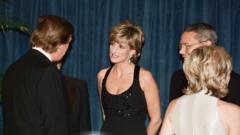What Drives Trump's 70-Year Obsession with the British Royals?

Published: 2025-09-17 09:35:36 | Category: wales
Donald Trump's fascination with the British royal family has deep roots, stemming from his childhood admiration for the spectacle of monarchy. His upcoming state visit to the UK, marked by pageantry and protocols, is a testament to that enduring connection. This article explores the intricate relationship between Trump and the royals, revealing how his upbringing and perceptions of royalty have shaped his public persona.
Last updated: 20 October 2023 (BST)
Key Takeaways
- Donald Trump's early exposure to the British royals significantly influenced his personal and professional identity.
- His second state visit to the UK highlights both his love for pageantry and the political motivations behind it.
- Trump has a history of using royal connections to enhance his image, often blurring the lines between admiration and opportunism.
- His interactions with the royal family, especially with the late Princess Diana, reflect his complex relationship with celebrity and nobility.
- Despite past controversies, the royal family remains accustomed to engaging with various political figures, suggesting a pragmatic approach to state visits.
A Childhood Influenced by Royal Pageantry
On 2 June 1953, a young Donald Trump sat captivated by the coronation of Queen Elizabeth II, a moment that left an indelible mark on his psyche. At just six years old, he watched intently on a black-and-white television alongside his Scottish mother, Mary Anne MacLeod Trump. Her admiration for the British royals was palpable, creating a lasting impression on young Donald.
In his book, The Art of the Deal, Trump reflects on how his mother's fascination with "pomp and circumstance" shaped his own sense of showmanship. This early exposure to the celebration of royalty instilled in him a desire for grandeur and recognition, elements that have come to define his public persona.
Trump's First Encounter with the Royals
During his presidency, Trump had the opportunity to meet Queen Elizabeth II at Windsor Castle. This meeting was significant for him, as he viewed it as a validation of his success. Trump's former national security aide, Fiona Hill, noted that he often shared his mother's admiration for the royals, suggesting that this connection was more than just a personal interest—it was a reflection of his aspirations.
In conversations with his then-First Lady, Melania Trump, he expressed excitement about the royal setting, remarking how his mother would have loved to witness such an event. This sentiment illustrates how Trump's perception of royalty is intertwined with family legacy and personal ambition.
The Role of Pageantry in Trump's Life
Trump's affinity for pageantry extends beyond mere admiration; it influences his business dealings and public relations strategies. Throughout his career, he has sought to cultivate an image that aligns with the glamour associated with royalty. For instance, during the 1990s, he attempted to enhance the status of his Mar-a-Lago estate by associating it with high-profile names, including Princess Diana. This strategy was met with skepticism from socialites who questioned the authenticity of such claims.
In 1980s New York, there were unsubstantiated reports that Prince Charles and Diana were interested in purchasing a luxury condo in Trump Tower. While Buckingham Palace later denied these claims, the incident illustrates Trump's penchant for leveraging royal connections to elevate his status. He has often navigated the fine line between genuine admiration and opportunism, using royal associations as a means to bolster his image.
Marketing Strategies and Royal Connections
Trump's marketing strategies have frequently involved attempts to embed himself within the world of the elite. For example, there were reports that he offered Prince Charles a complimentary membership to Mar-a-Lago, which was politely declined in favour of a charitable donation to the Prince's environmental initiatives. Such interactions reveal Trump's desire for legitimacy and acceptance within high society.
According to urban planner Wes Blackman, who worked with Trump, this fixation on royal associations stems from his need to be perceived as successful and historically significant. Blackman noted that Trump thrives on public recognition and the perception of being part of an exclusive circle.
The Complexity of Trump's Relationships with Royal Figures
Trump's relationship with the British royal family has not been without controversy. His attempts to connect with Princess Diana, whom he referred to as a "dream lady," exemplify his complicated fascination with royalty. Despite his claims of admiration, reports suggest that Diana found Trump's advances unsettling. She reportedly described him as giving her "the creeps," highlighting the tension between his public persona and private interactions.
Trump's comments about other royal figures have also been critical, particularly regarding Kate Middleton and Meghan Markle. His remarks have often stirred public debate, revealing a pattern of behaviour that blends admiration with a tendency to critique. This duality raises questions about his genuine respect for the monarchy and whether his comments are politically motivated.
Trump's Anticipated State Visit
As Trump prepares for his second state visit to the UK, the dynamics of his relationship with the royals will come into sharp focus. The invitation from King Charles, delivered by Prime Minister Keir Starmer, underscores the political motivations behind the visit. In a time of seeking trade concessions, the British government aims to strengthen ties with the former president, recognising the symbolic value of royal engagement.
Despite past controversies, royal watchers believe that the institution is well-equipped to handle the complexities of hosting varied leaders. According to Dickie Arbiter, a former press spokesman for Queen Elizabeth II, the royal family is accustomed to engaging with a diverse array of public figures, irrespective of past comments. He emphasises that the ceremonial aspects of the visit will take precedence over any historical grievances.
The Future of Trump's Relationship with Royalty
Trump's upcoming visit represents not just a continuation of his long-standing fascination with the British monarchy, but also a strategic effort to align himself with global power and prestige. His relationship with the royal family exemplifies a broader narrative of celebrity culture, where connections to nobility can enhance one’s public image.
As Trump steps onto the world stage once more, the interplay between his personal aspirations and the ceremonial nature of the visit will be closely scrutinised. His history of seeking adulation and legitimacy through royal associations continues to shape his public persona, leaving observers to ponder the implications of his enduring fascination with the British monarchy.
FAQs
What impact did Queen Elizabeth II's coronation have on Donald Trump?
Donald Trump was deeply influenced by watching Queen Elizabeth II's coronation as a child, as it instilled in him a fascination for pageantry and royalty that has shaped his public persona and aspirations throughout his life.
How has Trump sought to connect with the British royal family throughout his career?
Trump has attempted to connect with the British royals through various means, including purported offers of membership to his Mar-a-Lago estate and leveraging royal names to enhance his business ventures, often blurring the lines between genuine admiration and opportunism.
What was Trump’s relationship with Princess Diana?
Trump expressed admiration for Princess Diana, referring to her as a "dream lady," but reports indicate that she found his advances unsettling. He has also made comments about her that have sparked controversy, reflecting a complicated relationship with the royal family.
How does the royal family respond to controversial figures like Trump?
The royal family has a longstanding tradition of engaging with diverse political figures, irrespective of their past comments or controversies. The focus during state visits typically remains on ceremonial aspects rather than historical grievances.
What are the implications of Trump's upcoming state visit to the UK?
Trump’s state visit is expected to reinforce his desire for legitimacy and acceptance within high society. It highlights the intersection of politics and pageantry, particularly as the UK government seeks to strengthen ties with him during a crucial period.
As Trump prepares for another chapter in his relationship with the royal family, it raises intriguing questions about the nature of celebrity, power, and the enduring allure of monarchy in contemporary society. #DonaldTrump #BritishRoyalFamily #StateVisit



